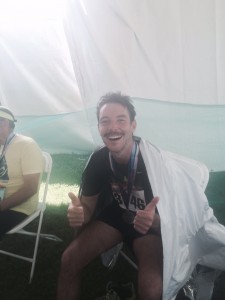Can you run a marathon without training?
I’m not going to recommend this. But maybe someone you know has casually suggested, “Oh yeah, if you’re in good shape, you can probably run a marathon anytime.” I used to say this even before I’d even run a half marathon. I always believed it, just never had a reason to test it. But that’s a pretty bold claim to make casually. Also, science.
So when I found out last Saturday that my friend had an extra bib for the Vermont City (Burlington, VT) Marathon happening the next day, I decided it was time to run some tests. After all, I had gone on a three-mile run the day before and had felt like I could have run at least five. My lungs had cleared up quickly from the pollution I acquired traveling in India. So I got the bib switched over to my name and started hydrating for the race happening in 16 hours.
Here’s what I mean by not training: In the six months leading up to the race, I went on a total of four runs. I ran 7 miles one time in March in India, and the heat destroyed me. I didn’t run anymore on the subcontinent. I got home to Vermont last week and went on three 3-mile runs. Then a day off, then the marathon. BUT, I’m in pretty good shape generally, as stipulated in the hypothesis above. I was recently doing a lot of walking in the foothills of the Himalayas, I have a regular yoga practice, and I have experience with long runs, including one previous marathon.
I did some internet research on running marathons without training, just to make sure I wasn’t going to die. People have done it. People in worse shape than me. People do die in marathons, but not training doesn’t seem to be why. OK, I feel encouraged. I also have good body awareness from the yoga, meditation, and other running I’ve done. So, I planned to go with the new-agey tactic of “listening to my body.” I promised to abandon my sense of ego which would be pushing for a faster time, and just focus on finishing the race.
It worked pretty well. Around mile 4 I had a brief moment of terror, remembering what it means to run 26.2 miles. But by mile 8 I was in the groove, watching the scenery and slowly letting the miles tick by. I passed the half-way mark about 30 minutes slower than my first marathon, but no big deal, I was in really good shape for that. And, eventually mile 18. I probably kept up an 8:30 min/mile pace until then. But, oof. Hit a wall. My quads started screaming, my tummy grumbling. I started walking at water stations, ran through sprinklers people had put out, and strongly considered grabbing the beer someone was offering from the sidewalk. But, onward!
Slowly, slowly, to mile 20, 21. Two things happened simultaneously. Thing 1: I realized I was going to finish. Even if I walked the rest of the way, I’d finish before they kicked me off the course. Thing 2: The wall turned into one of those evil demon walls that doesn’t just block your way, but actually attacks you as you approach it. Things hurt, my brain was tired of trying. Everyone was passing me, except one girl who was puking on the side of the course. I passed her. But then she started running again and passed me, too.

Celebrating the finish in the medical tent (just to get my toe cleaned up). Mustache is a must for impromptu marathons.
But, for science! I jogged as much as I could, walked a little bit, jogged some more. Eventually I found the finish line and crossed it. I made it in 4:01:53. Pretty decent time, mostly because I had a solid run for the first 18 miles. More importantly, now I know that it’s possible to run a marathon without training. And even more importantly than that, now I never have to do it again.
Maybe you are thinking (or have thought) of being stupid like me. Here’s some advice. Do you think you can finish a marathon? If so, I believe in you. You probably can. It will hurt, but that’s part of the “fun.” If you actually try this, don’t try to push your finishing time at all. I had some moments of wanting to break four hours (I knew I was right on the cusp), but speeding up might have meant pulling a quad or hamstring. It’s not worth it. Listen carefully to your body, and be fully prepared to withdraw from the race at any time if something is not right. Hydrate a lot before, and a lot during, especially if it’s warm out. Your body will be confused, and water helps everything, unless you don’t have enough salt. Eat enough salt. Plan to not be able to walk for two days afterwards.

Here I am not walking
Honestly, running a marathon in three hours was easier than running it in four. Less pain, less uncertainty, less worrying about injury. A lot more training, but I train because I like running in the first place. Now that I know this is possible, I’m not planning to ever do it again.
In summary: If you don’t like running, why would you run a marathon? If you do like running, you might as well train for it.



